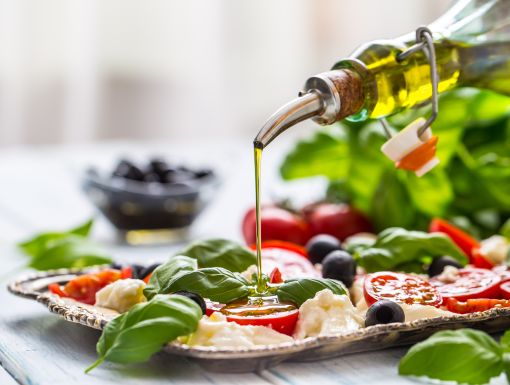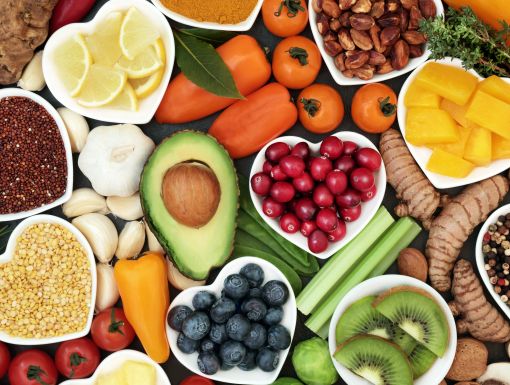
Is Canola Oil A Healthy Oil For Your Body?
Some options are better when deciding which cooking oil is healthiest and the best for baking, sautéing or drizzling. Extra virgin olive oil, avocado and coconut oil have all had moments in the spotlight and boast certain health benefits, but what about canola oil? Some debates surround canola on whether or not it is a healthy option, and here is how canola fares against the competition.
What is canola oil?
Canola is crossbred with the rapeseed plant, which is grown to produce oil for cooking and is in the same plant family as cabbage, broccoli and cauliflower. Canola plants have small yellow flowers, which develop into pods like pea pods. Each pod contains tiny black seeds made up of about 45% oil. Once harvested, canola seeds are squeezed to release the oil contained within the kernel. The oil is then refined and bottled as canola oil.
Canola oil is often found in store-bought foods, and it has a neutral flavor profile and can withstand high-temp cooking, making it versatile. The oil has a high smoke point — the temperature at which oil stops shimmering and starts to smoke and undergo chemical changes. A high smoke point oil is considered 400°+ Fahrenheit, and canola oil’s smoke point is 468°F.
Over 90% of canola oil crops are grown in the United States and genetically modified for pesticide resistance. A genetically modified organism (GMO) is a plant, animal, microorganism or other organisms whose genetic makeup has been adjusted in a laboratory. Canola crops are genetically modified to improve oil quality and make them resistant to herbicides. Only one gene is changed during the process. Being that genes are proteins and, during processing, proteins are removed and all that remains is oil, technically, there is no difference between canola oil made from GMO and non-GMO seeds. If avoiding GMOs is important, non-GMO options are available. All organic canola oil is made with non-GMO seeds.
Can canola oil go bad?
For canola oil to have a longer shelf life, buy canola in darker, tinted bottles to limit light exposure. Heat, light and air exposure can cause canola oil to spoil and become rotten. It is best to store the oil in an airtight container in a cool, dark place. It can last about one year if stored properly.
Is canola oil healthy for you?
Canola oil is considered a healthy oil because it is low in saturated and monounsaturated fat and has zero trans-fat. Canola oil is a healthier alternative than butter, lard and shortening and has more omega 6 and omega-3 fats, heart-healthy fats that help lower high triglyceride values in your blood. High triglycerides can be a sign of conditions that increase your risk of heart disease and stroke.
When used as an alternative to saturated fats (i.e., butter, lard and shortening), canola oil’s heart-healthy fats can help lower bad cholesterol and has been shown to reduce abdominal fat along with blood pressure in individuals at risk of metabolic syndrome.
Likewise, canola oil is a good source of vitamins E and K. Vitamin E is an essential nutrient for vision, reproduction, and the health of your blood, brain and skin. It also acts as an antioxidant. Vitamin K is found throughout the body, including the liver, brain, heart, pancreas and bone.
One tablespoon (15ml) of canola oil has:
- 124 calories
- 16% of the recommended daily amount of Vitamin E
- 8% of the recommended daily amount of Vitamin K
There are concerns that canola oil contains trans fats which give foods more flavor and texture. When canola oil is processed and refined, a small amount of trans fats is produced from the chemical hexane. Consuming trans fats can boost the risk of heart disease, stroke and type 2 diabetes.
Other healthy cooking oils
Variety is a good strategy when using oil. Healthy options with various flavor profiles and varying smoke points for different cooking techniques should be available in your local market. Here are some great options to add to your pantry:
- Coconut oil
- Coconut oil contains over 50% medium-chain triglycerides, which help treat various health disorders. Medium-chain triglycerides also increase metabolism slightly and help us feel fuller faster. Coconut oil may benefit cholesterol levels, mainly when used instead of animal-based saturated fats like butter. It is sweet with a nutty flavor.
- Extra virgin olive oil
- High in monounsaturated fats, extra virgin olive oil is rich in polyphenols, compounds with an anti-inflammatory effect that help protect our body’s cells from oxidative stress. Extra virgin olive oil has a bold, rich flavor. It has a low smoke point, so it’s best used for drizzling, dipping and recipes that don’t require much heat.
- Avocado oil
- With 70% monounsaturated fats, avocado oil is like olive oil, and it is slightly fruity with a very mild avocado flavor. Like canola oil, avocado oil has a high smoke point and is a great choice for drizzling or dipping and salad dressings, soups, sauces and dips.
Hemp seed oil
- Cold-pressed hemp seed oil has a nutty flavor, can be used as a salad dressing and has a low smoke point. Hemp seed oil also contains omega-6 and omega-3 fatty acids and other antioxidants. It is also high in vitamins B and D.
To schedule a nutrition consult, whether virtually or in-person call us at 504-733-1600.


